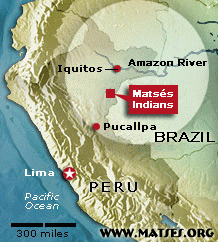|
PRESS
RELEASES
March
18, 2012
Modern-Day Genocide of Indigenous People
Epidemics of Hepatitis and Malaria Ignored by Health Officials
 Iquitos,
Peru, March 18,
2012
– During the 1960’s the Peruvian Air Force waged an open campaign of genocide
against indigenous people when they bombed villages of the Matsés tribe located
deep in the Amazon Rainforest. Today forty years later, the Peruvian government
is still effectively practicing genocide by ignoring epidemics of hepatitis and
malaria within Matsés communities that if occurred elsewhere, would receive
appropriate medical support. Incredibly, not a single health care
professional provides medical care in the 14 Matsés communities in Peru with a population of
over 2,000 natives. Iquitos,
Peru, March 18,
2012
– During the 1960’s the Peruvian Air Force waged an open campaign of genocide
against indigenous people when they bombed villages of the Matsés tribe located
deep in the Amazon Rainforest. Today forty years later, the Peruvian government
is still effectively practicing genocide by ignoring epidemics of hepatitis and
malaria within Matsés communities that if occurred elsewhere, would receive
appropriate medical support. Incredibly, not a single health care
professional provides medical care in the 14 Matsés communities in Peru with a population of
over 2,000 natives.
In many Matsés
communities, hepatitis is the leading cause of death with mortality rates of
over ten percent per year in some villages. The epidemic is due to the lack of
availability of clean water and by the Peruvian Ministry of Health not providing
hepatitis vaccinations. Not even very basic health care, such as vaccinations,
is provided to these indigenous people. Health care professionals say that
inexpensive preventive measures, such as providing wells and vaccines, could
easily stop this epidemic which has the potential to destroy the Matsés people
and with it their native culture.
Sidney Possuelo, the renowned
coordinator of Isolated Indians in the National Indian Foundation in Brazil
(FUNAI), concurs that governmental health authorities are neglecting their
responsibilities. He believes if the same situation occurred outside of the
indigenous communities, that the health authorities would order a quarantine and
address the problem instead of ignoring this epidemic of hepatitis.
Similarly, malaria has
reached epidemic levels and is decimating the Matsés people. To make
matters worse, the strain of malaria present is often quinine-resistant meaning
that conventional quinine drugs are ineffective. In cases such as this, the
World Health Organization recommends switching protocols to include an
artemisinin-based combination therapy (ACT). Artemisinin is derived from
plant-extracts from Artemisia species. The Peruvian Ministry of Health
has yet to implement the World Health Organizations recommendations to provide
ACT in areas where quinine-resistant malaria occurs. In fact, the Peruvian
government provides no malaria treatment or other medical support to the Matsés
communities.
The treatment of
indigenous people in Peru is in stark contrast to Brazil where in April of 2006
the government implemented "Vaccination Month for Indigenous People.”
Two-thousand health professionals gave hepatitis and other vaccinations to
approximately 37 thousand Indians from 103 different ethnic groups. The
campaign was promoted by the National Health Foundation (FUNASA) and was
supported by the Brazilian Ministry of Health and the Pan-American Health
Organization (PAHO). Ironically, the Matsés live on Peru’s border with Brazil,
yet those living in Peru are unable to receive the quality of medical support
available on the other side of the border due to current Peruvian policies with
respect to indigenous people.
The
Matsés Movement has been attempting to negotiate an agreement with the Peruvian
Ministry of Health to provide essential health care, but lack of funds has been
an obstacle. The Ministry of Health has the needed health professionals
but lacks resources for medicines and transporting personnel to the isolated
area where the Matsés people live.
|